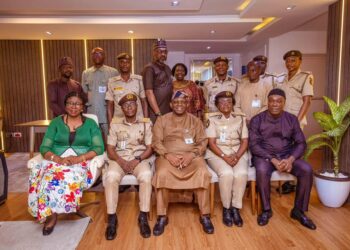Minister of Transportation, Rotimi Amaechi has urged Nigerian Shipowners to come together and form an equity company in order to be able to access the N100billion Cabotage Vessel Finance Fund (CVFF) which is held in trust for them by the Nigerian Maritime Administration and Safety Agency (NIMASA)
Amaechi stated this in Lagos yesterday at the launching of a book written by two maritime journalists; Mrs Hope Orivri and Mr Obiajulu Agu titled: Beacons of Nigeria Maritime Industry.
The minister lamented that even after he secured a contract for Nigerian shipowners in Singapore with an international shipping line, PIL, which requires that Nigerian investors to come up with 40% of the funding of a national carrier, none of the shipowners and stakeholders are willing to come up with money.
He noted that one of the major reasons it has been difficult for shipowners to come together is the multiplicity of associations.
Amaechi also pointed out that the Federal government has played its part by providing the Cabotage Act, ascribing all national cargoes to Nigerian shipowners. He said the indigenous players need to play their part by getting a vessel.
"The Cabotage fund is there for them to access, but they must meet the requirements for them to access it, and the cost of a vessel is twice much more than the Cabotage fund, so they must show evidence that they have their own contributions before we can make the fund available to them", he said.
He however added that “it cannot be given to just one person, so it is either they come together and get the benefit for themselves. We are at a crossroad because we don't know who to give it to", he lamented.
"Even if we draw up the guidelines and decide to give one man N5billion, it costs more than a N100billion to buy a vessel, unless they agree that we give the whole of the money to one person and hold the person responsible, or they all come together either as a corporative or whatever, and hold equity in the investment that involves that money", he advised.
He assured that as soon as the shipowners can come together and speak with one voice and provide their share of equity, the CVFF would be added to it and utilised as the required 40% equity for floating the National carrier in partnership with PIL.
He also said that the process of paying back the money would also be spelt out clearly.
"I even told them that I would make that money available for them (the Nigerian investors), the moment they are ready to buy the vessel that will fly the Nigerian flag, I will make that money available as part of it, but till today, nobody has come back to me. The money is there and we are ready to release it", he declared.
Chairman of the ceremony, who is also the Chairman of Shipowners Forum; Mrs Margaret Orakwusi stressed the need for the CVFF to be used to float a maritime bank which she said would understand the need of the investors.
She said that what distinguished the foreign operators from Nigerian shipowners is their access to cheap funding.
She noted that Nigerians pay 20% interest rate on loans while foreigners pay as low as 2% interest rate.
While commending authors of the book, Beacons of Nigeria Maritime Industry, Orakwusi described the book as one that celebrates a lot of success stories of maritime industry practitioners.
"It's a book that identifies the success stories we have in the maritime industry, it is kindly recommended for all schools and institutions of learning because our kids today celebrate money, not minding where the money was coming from, but these are people who laid solid foundation for their success and impacting positively to the society" she said.
On her part, one of the authors of the book, Mrs Hope Ovriri said the idea behind the project was to search the mix of the building blocks of the lives of people in the maritime industry; their backgrounds, activities and experiences that shaped them, their contributions to the industry, noting the tipping points that would inspire particularly young people.
She assured that this is the first volume of the book, assuring that other editions would follow, in order to continue to document and share life lessons and experiences of contributors to the maritime industry in Nigeria.
The book features 50 personalities in the industry.












Discussion about this post